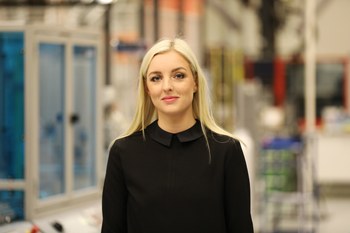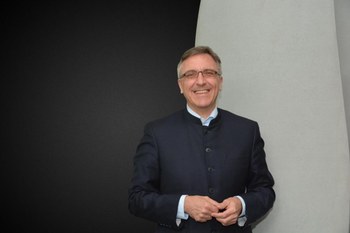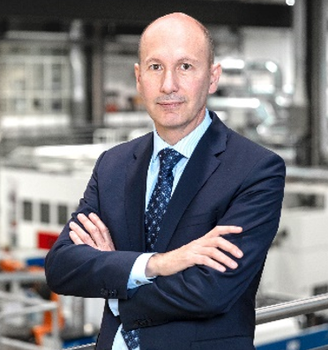Keynote Speakers
Prof. Ann-Louise Andersen
Associate Professor in Changeable Production, Department of Materials and Production, Aalborg University, Denmark

Ann-Louise Andersen is Associate Professor at the Faculty of Engineering and Science at Aalborg University, Department of Materials and Production. She holds a MSc in Management Engineering with specialisation in Operations and Supply Chain Management from Aalborg University. She received a PhD in 2017 from Aalborg University with a thesis about development of changeable and reconfigurable manufacturing systems. The thesis was done in collaboration with the world’s largest pump manufacturer and a manufacturer of construction equipment. After this, she was employed as tenure track Assistant Professor from 2017-2021 at the Faculty of Engineering and Science at Aalborg University, Department of Materials and Production. She quickly advanced and was promoted to Associate Professor in 2021. From 2018-2023 she was Guest Assistant Professor at the Department of Industrial Product Development, Production and Design, School of Engineering, Jönköping University. She has since 2018 been Research Affiliate in CIRP (The International Academy for Production Engineering), mentored by Professor Hoda ElMaraghy.
Ann-Louise Andersen has extensive experience in research on changeable, reconfigurable, modular, platform-based, sustainable, and circular production and her research is characterized by high industry relevance and close collaboration with industry, e.g., leading automotive enterprises, the world’s largest pump manufacturer, the world-leading enterprise providing sustainable energy solutions, and numerous SMEs. She has broad experience with national and international research projects, recently the REKON project (Development of Reconfigurable Manufacturing) with collaboration with more than 70 manufacturing companies funded by the Danish Industry Foundation and the REFUSE project (Resource Efficient Ese and Development of Reconfigurable Machining Systems) funded by Vinnova Sweden.
Ann-Louise Andersen has since 2016 published more than 70 peer-reviewed research papers. She has recently published a book (English and Danish versions) on development of reconfigurable production targeting industrial audiences (“Paving the way for changeable and reconfigurable production: Fundamental principles, development method and examples”). Ann-Louise Andersen was the chair of the CARV2021 conference hosted at Aalborg University in conjunction to the MCPC2021 conference.
Paving the way for Changeable, Reconfigurable, and Sustainable Production: Principles, Industrial Examples and Future Trends
The concept of the Reconfigurable Manufacturing System (RMS) was coined 25 years ago, but its development, implementation, and exploitation remain both a necessity and a challenge. Nowadays, companies not only need to bring complex, customized, and high variety products to the market in short time under high pressure for cost-reduction - which is a challenge for both product and production system development - but also need to incorporate high levels of robustness and resilience and new approaches to become circular and climate-neutral – which is a challenge on all levels from the manufacturing systems to the entire value chains. However, while principles of changeability and reconfigurability can significantly support this transition of production to become more sustainable, human-centric, and resilient, many industries and companies are still struggling with realizing these potentials. This keynote will address the realization of changeability and reconfigurability in the manufacturing industry, based on insights from more than 9 years of research in the Danish manufacturing industry, research collaboration with more than 100 companies, and a new industry-applicable method and supportive tools for developing and utilizing reconfigurability. Furthermore, principles and examples will be presented for how reconfigurability can be a key driver for human-centric, resilient, and sustainable production, e.g., by enabling distributed manufacturing and adaptable value chains, supporting remanufacturing, product take-back, and reuse in manufacturing, and by incorporating human-oriented approaches to the reconfiguration process.
Prof. Thomas Gries
Univ.-Prof. Prof. h.c. (MGU) Dr.-ing. Dipl.-Wirt.Ing., RWTH Aachen University (Germany)

Thomas Gries, born in Cologne, Germany, in 1964, studied at the RWTH Aachen University, Germany. He holds a diploma degree in mechanical engineering and economics and a doctorate in mechanical engineering. From 1995 to 2001, he worked at Lurgi Zimmer AG, Frankfurt am Main, Germany, at the Department of Technologies for Fibres & Textiles in leading positions.
Since 2001, he is Director of the Institut für Textiltechnik (ITA) of RWTH Aachen University. The honoris causa professorship of Lomonossow University, Moscow, is the most distinguished scientific award of Russia given for his achievement of 3D-tailored composite reinforcements. In 2019 he was Distinguished Visiting Researcher at Seoul National University dedicated to 4D-Textiles. ITA was established in 1934 and is one of the world’s leading textile research institutes. Its fields of research comprise man-made fibre technology, staple fibre processing, fabric production, technical textiles & composites, medical textiles & biomaterials as well as smart textiles & joining technologies.
Today Thomas Gries is the thought-leader in 3D- & 4D-textiles. He made ITA the leading institution in digitalization and biotransformation of the textile sector.
Industry 4.U: Moving beyond operational efficiency
We are at the dawn of a paradigm shift! Technological progress is enabling goods to be produced ever faster, more efficiently and more cheaply. At the same time, customer demands are becoming increasingly sophisticated. In the textile and apparel sector in particular, demand for individualized clothing has risen significantly. The production of batch size 1, on the other hand, is not economically feasible due to low margins. Approaches known as mass customization are a compromise: the aim is to produce individualized clothing using standardized processes and thus the efficiency of mass production.
The particularly important component of this concept is the integration of the customer into the value chain. Value-orientation works only through the perspective of the customer! By an appealing and individually designed interface, the customer becomes part of the production process. By exploiting the potential of I4.0 technologies and linking them to individual customer value perception, a transformation to user- and customer-centric production is taking place - Industry for you (I4.U). Industry4U is the paradigm shift from lean to value management! This keynote speech deepens how to structure user centered industrie4.0 and how to engineer microfactory solutions.
Prof. Dr. Ing. M. F. Zaeh
Director of the Institute for Machine Tools and Industrial Management (IWB), Technical University of Munich

Prof. Zaeh is director of the iwb (Institute for Machine Tools and Industrial Management). He studied mechanical engineering at the Technische Universitaet Muenchen with internships at a tool and die shop, a machine tool builder and an automotive supplier. Suggested by Professor Dr. Joachim Milberg his Diploma thesis was awarded the student prize of the VDW, the German machine tool builders’ association.
Michael Zaeh started his professional career in the year 1990, assuming a position as Graduate Research Assistant at the Institute of Machine Tools and Industrial Management of the Technische Universitaet Muenchen (iwb), where he received his doctorate in the year 1993 with a thesis about a dynamic process model for circular sawing. From 1994 until 1995 he was head of a department under the new director of the institute, Prof. Dr. Gunther Reinhart.
In 1996 Michael Zaeh joined Gleason-Pfauter Maschinenfabrik GmbH, a builder of machine tools for manufacturing of gears, where he worked in the research laboratory and in the design department during the first year. Later he was promoted head of the order management department. Since 1997 he was a member of the management group. From 1998 until 2002 he worked in an ERP-system-implementation project at several production sites and sales agencies of the Gleason Corporation. During that time he stayed in Rochester, N.Y., USA, for two years and he worked also in South Korea, Great Britain, Brazil and Japan.
In the year 2002 Michael Zaeh accepted the position of full professor for machine tools and manufacturing technology. Prof. Dr. Michael Zaeh is a member of acatech, the German National Academy of Science and Engineering, of the WGP (German Scientific Society for Production Technology), of the WLT (Scientific Society of Laser Technology) as well as of several other institutions. He is fellow of CIRP (The International Academy for Production Engineering) and a member of the council of the Bavarian Employers’ Association (vbw).
Sustainability in Manufacturing – A sense of Urgency and Opportunities
Mankind is under severe pressure to act against the climate change and to deal with shrinking resources. The manufacturing industry is responsible for a significant share concerning pollution, greenhouse gas emissions as well as energy and raw material consumption. We have to act now in order to avoid irreversible damage to our planet and to counteract the danger of mass extinction of animal species. This keynote speech deepens appropriate measures for manufacturing and product design with respect to the triple bottom line (ecolocical, economical and social). Current examples from research will be given on how to become more sustainable in terms of energy consumption, product reuse and human involvement.